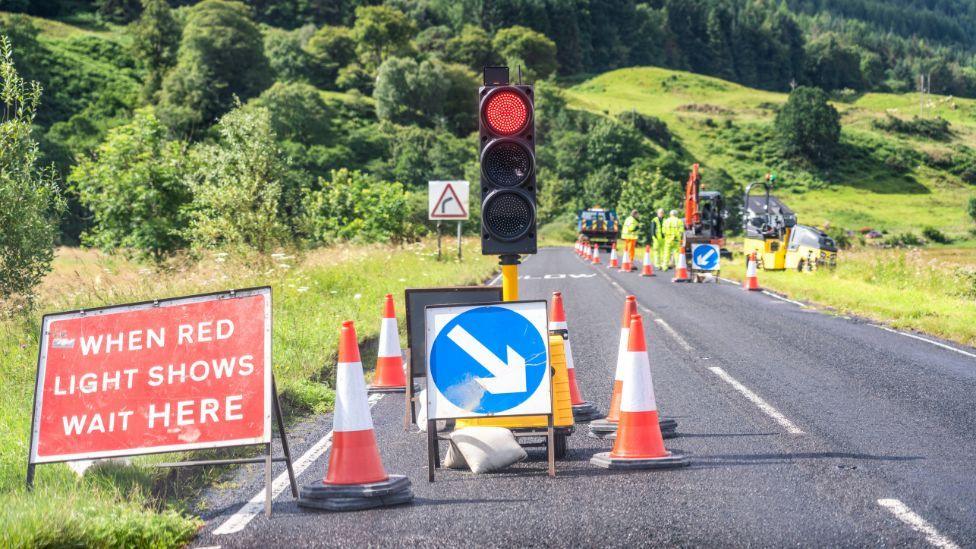Scotland's councils make cuts to plug £650m budget gap

Council services such as road maintenance could be affected by cuts
- Published
Scotland's councils are facing a £647m budget shortfall this year despite an increase in government funding, a watchdog has said.
The Accounts Commission warned that funding had not kept pace with inflation, higher costs and increased demand for public services.
Local authorities are making cuts, hiking taxes, raising charges and drawing on reserves to cover the budget gap, the commission found.
It warned of further financial pressure on councils from public sector pay deals and a UK government increase in employers' National Insurance.
Councils warned over scale of financial challenges
- Published28 January
Councils must speed up reform to save services - watchdog
- Published1 October 2024
Most of councils' revenue funding - used for day-to-day costs such as wages, schools, road maintenance and bin collections - comes from the government.
The Scottish government is to provide £15.2bn of funding to local authorities in 2025-26, a 6% increase in real terms on the previous financial year.
But mounting financial pressures means there will be a £647m gap between councils' predicted spending and the funding and income they receive, according to the Accounts Commission.
This is up by £52m from 2024-25, with the commission forecasting a cumulative revenue budget gap of £997m over the next two years.

Councils have made cut to children's services to help plug a financial gap
To help plug the gap, every local authority in Scotland has increased council tax by at least 6%. It came after a nationwide freeze was lifted.
The average increase was 9.6%, with Falkirk Council imposing the steepest hike of 15.6%.
The commission said higher bills for local people meant there was a "greater expectation on the performance of local services", while an ageing population added further strain on services such as care.
The report found that the biggest cumulative cuts were falling on corporate services (£68m) and children's services (£58m).
With local authorities warning they will have to make further cuts in the future, the commission said this approach was unsustainable.
'Change at pace'
Commission member Derek Yule told BBC Scotland News: "Council finances are precarious at the moment after years of funding challenges.
"We're looking at the ways in which councils have balanced their budgets and suggesting that that cannot continue in its current form.
"So councils need to look at how they can work with communities and work with partners to deliver change and to deliver change at pace."
The commission reported that while overall capital funding – primarily used for buildings and infrastructure – had increased by 16% to £780m, it had not risen to previous levels.
It warned local authorities would be heavily reliant on borrowing to fund their planned £4.7bn capital investments in 2025-26.
While overall capital funding has increased, three councils were projected to receive less, in real terms, than last year.
In two of those local authorities, East Lothian and Stirling, reductions in capital funding were forecast to offset increases in revenue funding, resulting in a real-terms reduction in their overall budget.
'Breaking point'
Katie Hagmann, the resources spokesperson for council umbrella body Cosla, said the report showed evidence of the financial pressures faced by local authorities.
She said: "Rising inflation, increased costs resulting from higher employer national insurance contributions and pay, and ever-growing demand on vital services like social care are pushing local budgets to the breaking point.
"Councils have worked tirelessly to protect the services that matter most – such as schools, roads, housing, and supports for vulnerable people, to name but a few – yet the gap between what is needed and what is available continues to widen."
What did we learn from Swinney's plan for the year?
- Published6 May
Scottish Conservative finance spokesman Craig Hoy said: "The black hole the SNP have overseen in local authority budgets means hard-pressed taxpayers are now paying more and more but getting less and less in return."
Labour local government spokesman Mark Griffin urged ministers to deliver "consistently fair funding for local government" and to work with councils to "modernise services so they are fit for the future".
Liberal Democrat finance spokesman Jamie Greene claimed there was a "titanic gulf between what the SNP have provided and what councils say they actually need to maintain basic local functions".
A Scottish government spokesperson said ministers had provided a real-terms increase in funding for local government in 2025-26, "building on continued increases in recent years".
They added: "The Scottish government will continue to work in partnership with local government to address the challenges facing council budgets and ensure we are operating sustainable people centred public services that communities expect and deserve."